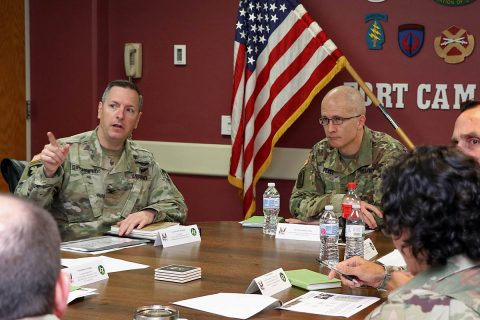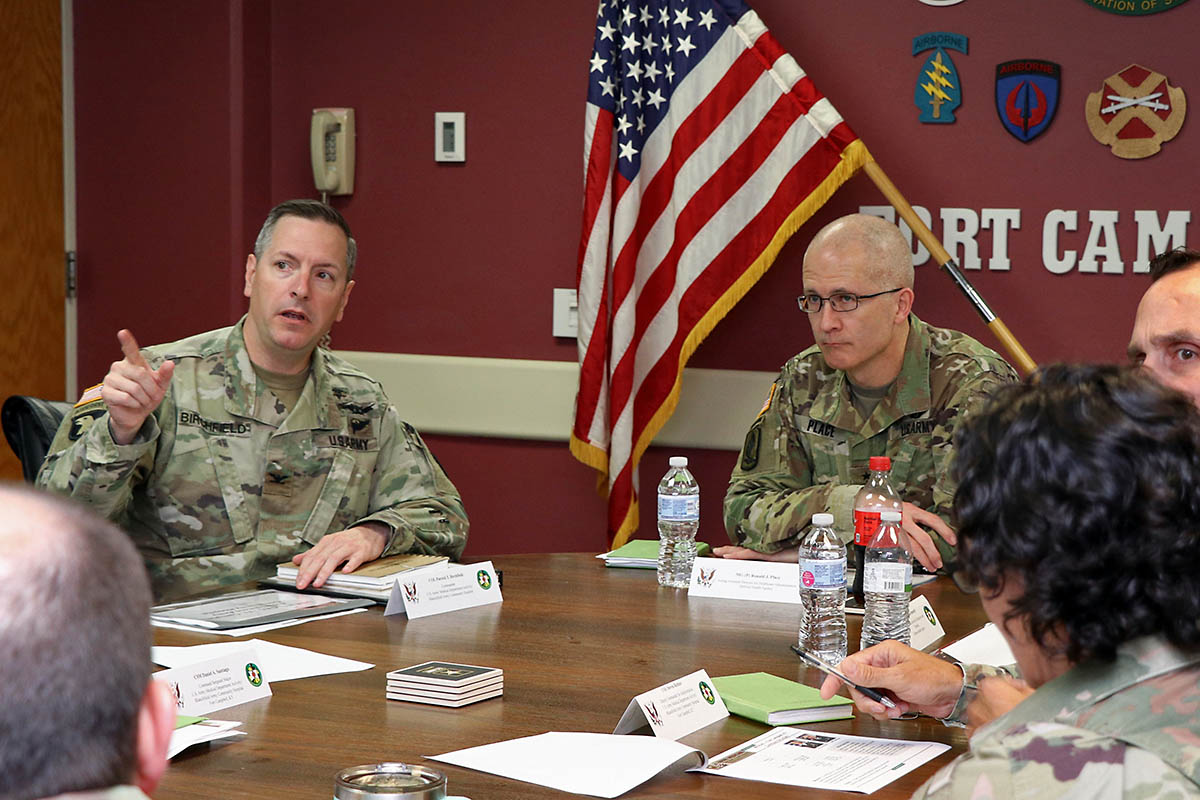 Fort Campbell, KY – The Defense Health Agency’s acting assistant director for health care administration visited Blanchfield Army Community Hospital (BACH) and Fort Campbell, Kentucky August 7th, 2019 for more discussion about the hospital’s transition to DHA October 1st.
Fort Campbell, KY – The Defense Health Agency’s acting assistant director for health care administration visited Blanchfield Army Community Hospital (BACH) and Fort Campbell, Kentucky August 7th, 2019 for more discussion about the hospital’s transition to DHA October 1st.
Maj. Gen. Ron Place, who was recently confirmed for promotion to lieutenant general and selected to serve as the next director of DHA, was accompanied by Air Force Chief Master Sgt. Julie Bottroff, senior enlisted representative.

Place led DHA’s transitional intermediate management organization and has worked closely with personnel from Army Medicine, Navy Medicine and Air Force Medicine to reach the desired end state as outlined by law in the National Defense Authorization Act of 2017.
It called for transitioning the administration and management of military hospitals and clinics of the three separate military health systems of the Army, Navy and Air Force to one, managed by a single Defense Health Agency.
“The importance for each of the services is that while they’ll lose their alignment of service designated healthcare organizations, the position of the Defense Health Agency is always going to be support to the services,” said Place. “So, whether it’s Army Medicine supporting the 101st [Airborne Division] or the Defense Health Agency supporting the 101st, that support will continue to be there.”
Place said supporting forces remains the number one priority of the Defense Health Agency.
“In terms of what doesn’t change — that’s one of those key things that doesn’t — our support of uniformed personnel, in this particular location, it’s the Soldiers of the 101st and Fort Campbell,” said Place, who also met with leaders from the 101st Airborne Division.
Under the transition, DHA will be responsible for health care delivery and business operations across the Military Health System and provide guidance on: budget, information technology, health care administration and management, administrative policies and procedures, and military medical construction.
For beneficiaries, health care delivery in the Military Health System essentially remains the same and possibly better because it allows collaboration and shared resources across more facilities to improve the delivery and coordination of health services.
“In some cases, there are things that are better in one service than they are in another and for whatever reason that collaboration, that transfer of knowledge, just didn’t happen before and so [building the] collaboration has been useful,” said Place, speaking of some of the benefits realized since medical treatment facilities in the National Capital Region; Fort Bragg, North Carolina; Naval Air Station Jacksonville, Florida; and Keesler Air Force Base, Mississippi transitioned to DHA.
At Blanchfield, the transition has sparked questions from Soldiers and federal employees about what the transition would mean for them, and if their mission will change. Place held a town hall for hospital staff to answer their questions and share information.
Place said DHA and the military departments are committed to ensuring the civilian talent in the military medical departments is retained to the greatest extent possible. More than 1,500 federal service civilians are employed at Blanchfield, supporting the medical readiness of Soldiers assigned to the 101st, Fort Campbell-based units and caring for Soldiers, Retirees and their families. Because the mission is virtually the same, Place said he doesn’t expect the transition to have any negative impact on Blanchfield’s civilian workforce.
During a visit last week, Place’s brother, Brig. Gen. Michael L. Place, who is currently serving as the Army’s Regional Health Command-Atlantic commander and oversees Blanchfield and other Army military treatment facilities from Fort Drum, New York to Fort Buchanan, Puerto Rico, shared the results of an assessment of the hospital.
“The Army has looked at our medical treatment facilities over and over again and we’ve got it just about right. The visits from DHA and Health Affairs have come down and validated that Blanchfield is the right size hospital doing the right kind of activities that we want them to do for support of a community of this size, providing this amount of readiness to our operational forces,” said Brig. Gen. Place.
Maj. Gen. Place and Col. Patrick T. Birchfield, Blanchfield commander, also met with CEOs and operational leaders from nearby health care organizations who support military health care beneficiaries through TRICARE and the Tennessee Valley Healthcare System to share information and answer their questions about the transition.
“For our partners, their willingness to partner with us sometimes appears to go unrecognized and it’s very clear to me that the partners that Fort Campbell has, specifically Blanchfield Army Community Hospital has with local medical communities, is both deep and powerful and sadly, that’s not present everywhere across the world. The fact that it is here, potentiates the impact of the health care delivery system here and my personal thanks is to all those partners as they work so hard with us to help take care of our beneficiaries and we’re very thankful for it.”
Blanchfield and its entire network of TRICARE partners care for the needs of nearly 100,000 eligible beneficiaries.



